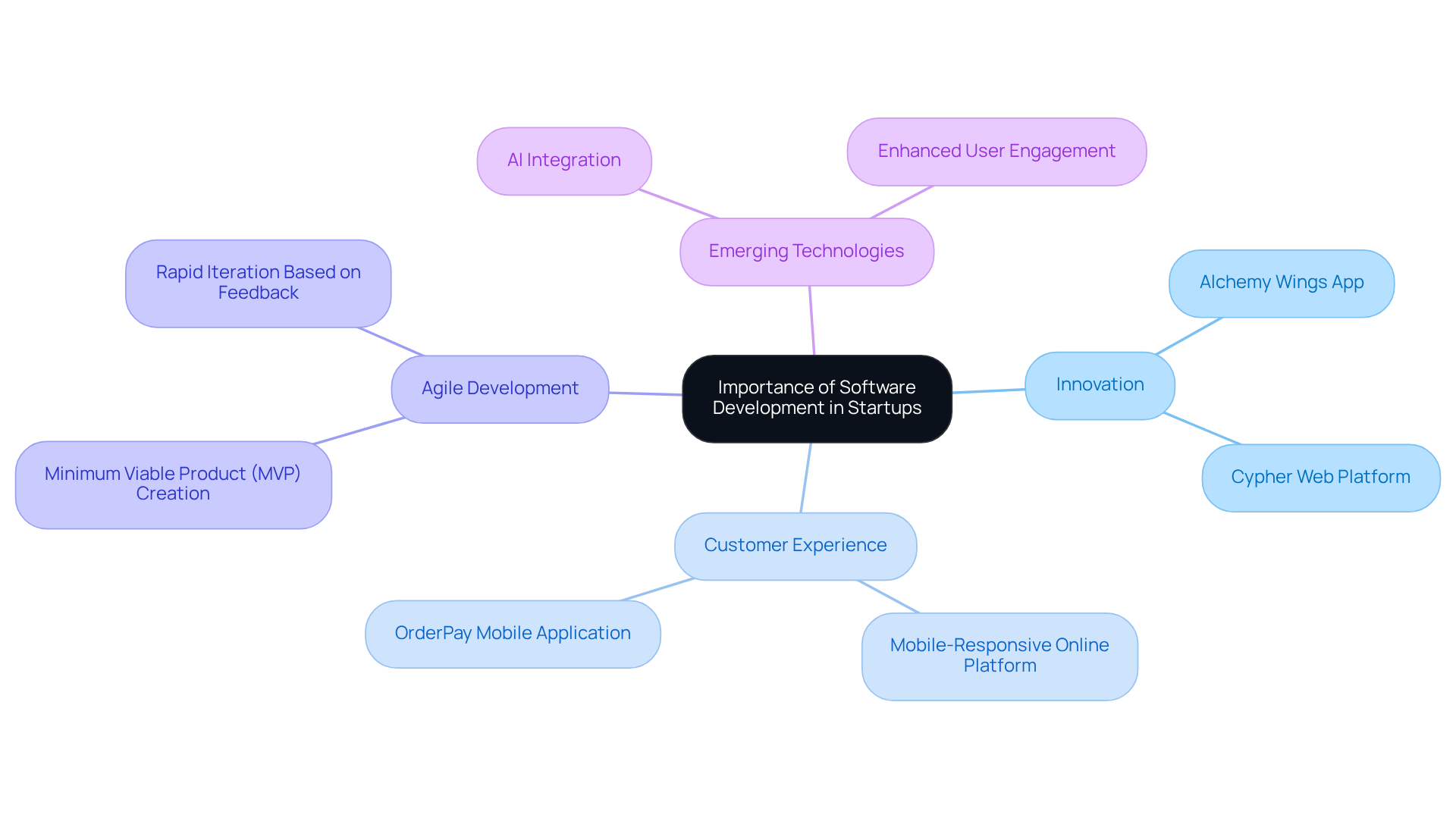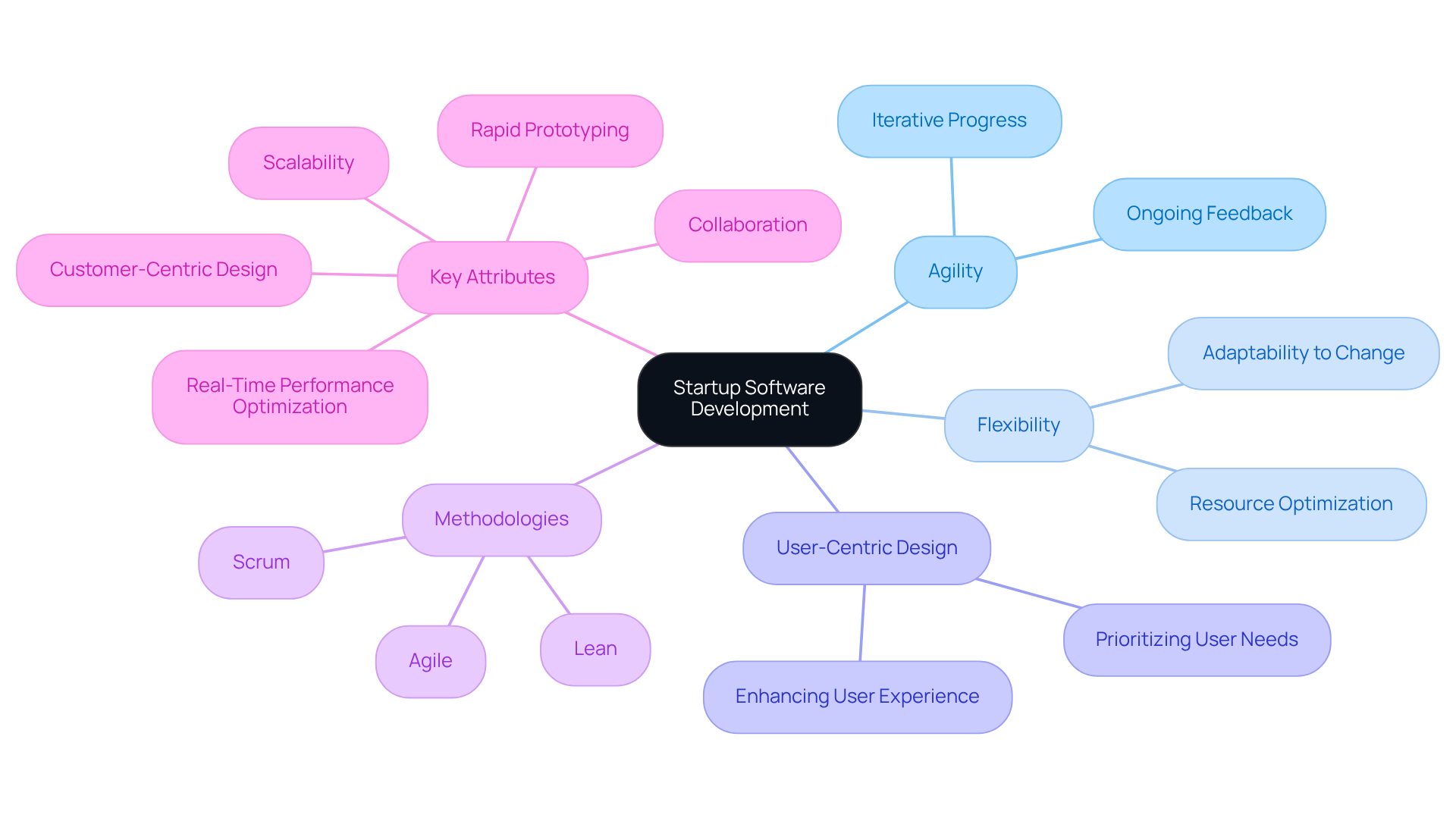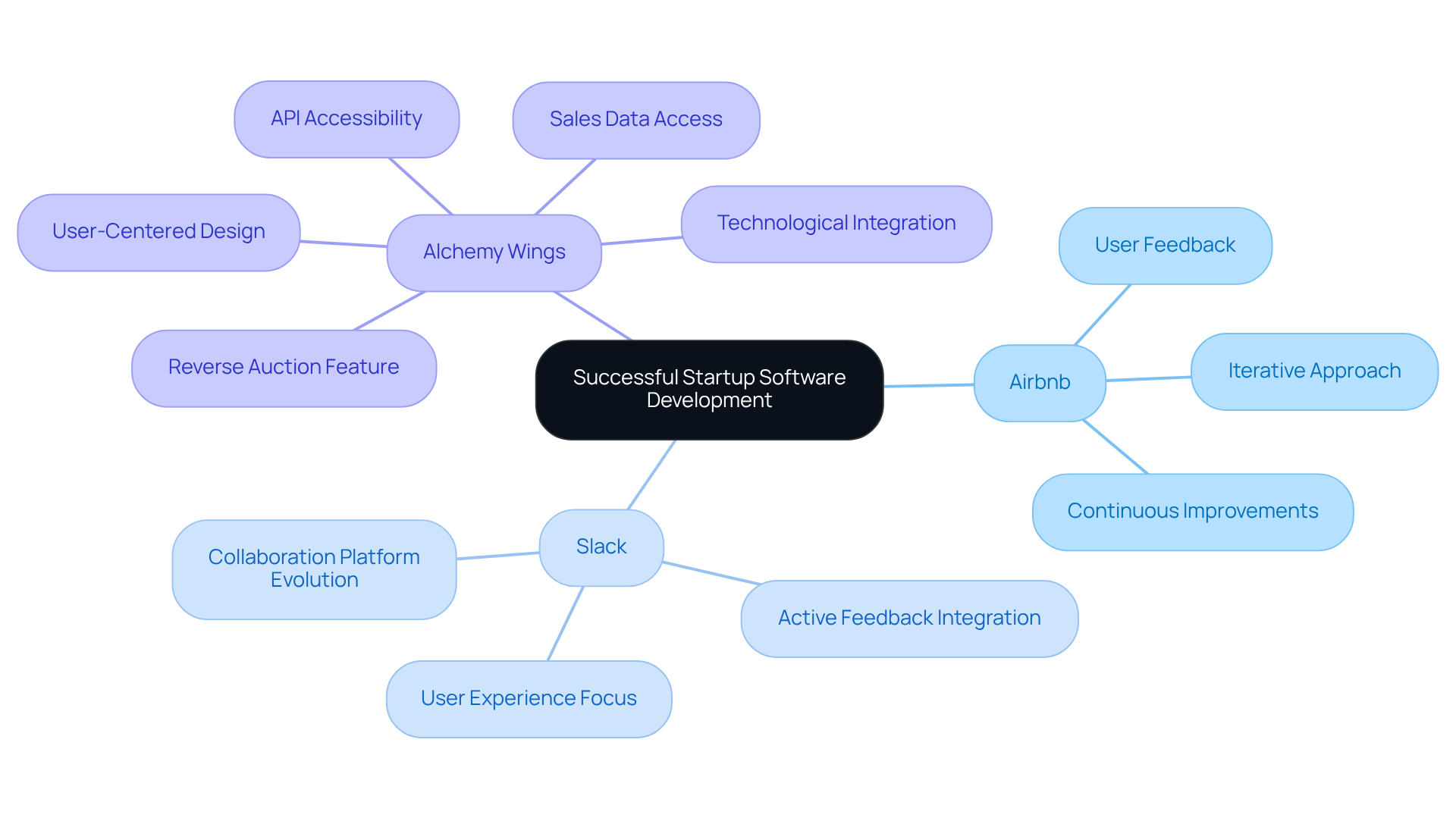AI
our blog
Understanding Software Development for Startups: Key Insights

Overview
Software development for startups is essential, as it facilitates the creation of customized software solutions that tackle distinct challenges. This approach emphasizes agility and user-centric design, which are vital for maintaining competitiveness in today's fast-paced market. Furthermore, methodologies such as Agile and Lean play a crucial role in this process. By employing rapid prototyping, soliciting customer feedback, and engaging in continuous iteration, startups can effectively achieve product-market fit and enhance operational efficiency. Real-world examples of successful startups illustrate these principles, reinforcing the necessity of these strategies in the software development landscape.
Introduction
In an era where innovation serves as the lifeblood of new ventures, the significance of software development for startups is paramount. As these fledgling companies strive to carve out their niche in competitive markets, they encounter unique challenges that necessitate tailored software solutions. This article explores critical aspects of software development for startups, examining methodologies that enhance agility and user engagement, alongside real-world examples that underscore successful strategies. Furthermore, as the landscape evolves with the rise of low-code technologies and AI integration, how can startups effectively navigate these changes to ensure sustainable growth and success?
Define Software Development for Startups
Software development for startups necessitates the design of customized software solutions that address the unique challenges faced by early-stage companies. This process encompasses ideation, prototyping, and deployment, all while navigating constraints such as limited budgets, tight timelines, and the necessity for rapid iteration. Startups must prioritize agility, enabling them to swiftly adapt to market demands and user feedback—crucial for maintaining a competitive edge in a fast-paced environment.
In 2025, startups will encounter distinct challenges in application creation, particularly the need to utilize low-code/no-code technologies, which are projected to account for 70% of new business applications. This shift is propelled by a global shortage of skilled programmers and the urgent need for faster time-to-market. Furthermore, the integration of AI tools is becoming standard practice, with 92% of developers employing AI coding assistants to enhance productivity and streamline workflows.
Successful software development for startups often involves the adoption of agile methodologies, boasting a 64% success rate compared to the traditional waterfall approach, which stands at 49%. By embracing a human-centered design philosophy, startups can ensure their products resonate with users, ultimately leading to improved market fit and customer satisfaction.
Moreover, leveraging DevOps automation at Studio Graphene enhances deployment efficiency and security, facilitating one-click deployments and rollbacks that streamline digital product updates. Continuous integration practices ensure that code changes are regularly merged and tested, enabling rapid iteration and responsiveness to user feedback. Security measures integrated within DevOps automation safeguard cloud infrastructure throughout the lifecycle. With robust incident management processes in place, organizations can significantly reduce downtime and swiftly restore services in the event of issues. As the technology creation landscape evolves, grasping the dynamics of software development for startups will be vital for new companies seeking to thrive in an increasingly competitive market.

Contextualize the Importance of Software Development in Startups
In today's digital landscape, software development for startups is a pivotal factor in the creation of robust programs that contribute to the success of new businesses. As emerging ventures strive to innovate and disrupt traditional markets, effective software development for startups becomes indispensable.
For instance, the development of an accessible mobile application and a mobile-responsive online platform for Alchemy Wings exemplifies how proficient program creation can optimize ordering processes and elevate customer experience. This platform not only boasts an intuitive user interface but also grants access to comprehensive sales data via an admin portal, underscoring the significance of data-driven decision-making.
Moreover, the integration of a delivery validation system for individual drivers illustrates how innovative solutions can enhance operational efficiency. Additionally, the cutting-edge web platform crafted for Cypher improves online course accessibility and backend functionality, while the mobile application for OrderPay enriches dining experiences through seamless ordering and payment processes.
Efficient software development for startups enables new businesses to create Minimum Viable Products (MVPs) that can be tested in the market, gather customer feedback, and iterate rapidly. This agile approach to software development for startups allows them to pivot based on empirical data, mitigating the risk of failure and increasing the likelihood of achieving product-market fit.
Furthermore, with the advent of AI and emerging technologies, software development for startups allows them to leverage these tools in their application development to enhance user engagement and operational effectiveness, setting themselves apart from competitors.

Identify Key Characteristics and Methodologies of Startup Software Development
Startup application creation is defined by its focus on agility, flexibility, and user-centric design. Methodologies such as Agile, Lean, and Scrum are prevalent, emphasizing iterative progress and ongoing feedback. Startups often embrace a 'fail fast' mentality, enabling them to quickly test hypotheses and learn from failures while minimizing resource loss. Successful startup software development is characterized by several key attributes:
- Rapid Prototyping: The swift creation of a working model allows for the testing of ideas and the gathering of user feedback.
- Customer-Centric Design: Prioritizing the needs and experiences of users ensures that the product resonates with its intended audience.
- Scalability: Applications are designed to expand and adapt as the business evolves and user needs change.
- Collaboration: Cross-functional teams work together, fostering innovation and efficiency throughout the development process.
- Real-Time Performance Optimization: Applications must strike a balance between cost, speed, and resource allocation, which is essential for the success of any digital product.
At Studio Graphene, we guide you through your digital journey with our tailored Discovery, Design, and Build services, focusing on software development for startups to ensure that your startup thrives in a competitive landscape.

Examine Real-World Examples of Successful Startup Software Development
Numerous startups have adeptly navigated the application creation landscape, exemplifying the principles discussed in this article. For instance, Airbnb commenced as a basic platform for renting air mattresses and has since transformed into a global hospitality leader. Their iterative approach to application development facilitated enhancements based on user feedback, leading to continuous improvements and feature upgrades.
Another compelling case is Slack, which originated as an internal communication tool for a gaming company. By focusing on user experience and actively integrating feedback, Slack evolved into a widely adopted collaboration platform. This success underscores the critical importance of understanding client needs and adapting technological solutions accordingly.
A noteworthy example is Alchemy Wings, which developed an innovative logistics platform emphasizing user-centered design and technology integration. They introduced a reverse auction feature accessible through an API, allowing delivery partners to efficiently connect and bid for jobs. The platform also leveraged technologies such as Google Maps for distance and journey time calculations, alongside MangoPay for seamless payment processing, ensuring an efficient ordering experience. Furthermore, it provided vendors with straightforward access to sales data and delivery validation systems. This case illustrates that effective software development transcends mere coding; it necessitates market understanding, iterative feedback incorporation, and continuous evolution to meet user demands.

Conclusion
Software development for startups stands as a cornerstone of success in an increasingly competitive landscape, where tailored solutions are essential to address the unique challenges faced by emerging businesses. This process necessitates a strategic focus on agility, user-centric design, and rapid iteration to ensure that products not only meet market demands but also resonate with users. As startups navigate constraints such as limited resources and tight timelines, the ability to adapt quickly becomes vital for maintaining a competitive edge.
Key insights from the discussion underscore the importance of:
- Adopting agile methodologies
- Leveraging low-code/no-code technologies
- Integrating AI tools to enhance productivity
Real-world examples, such as Airbnb and Slack, illustrate how successful startups have embraced iterative development and user feedback to continuously refine their products. Furthermore, the emphasis on creating Minimum Viable Products (MVPs) allows startups to validate their ideas swiftly, gather insights, and pivot as necessary, significantly reducing the risk of failure.
Ultimately, the significance of effective software development in startups cannot be overstated. As technology continues to evolve, embracing innovative methodologies and tools will be crucial for new ventures aiming to disrupt markets and achieve sustainable growth. Startups are encouraged to invest in robust software development strategies that prioritize user engagement and operational efficiency, thereby setting the stage for long-term success in a dynamic business environment.









